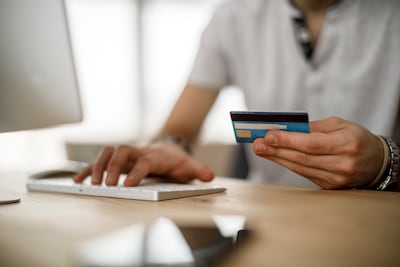Credit cards serve as ultra-short-term loans from a bank. You have a credit limit depending on your income, current debt burden and credit score.
When you use your credit card, the merchant takes the money from the bank and you are required to pay the lender back the next month.
Usually, a statement is issued around the 5th to 8th of the month, calculating all your spending for the previous month, and you have 21 to 25 days to pay the balance, after which you will be charged interest.
Credit cards differ from debit cards. Debit cards are linked to your current or savings account and vendors take payment from your money.
Credit card dangers
The predominant risk of using a credit card is spiralling debt. Banks make money from credit cards because people don’t pay their balance in full every month.
Many people are not aware of the charges and interest rates associated with their card, so do your due diligence before you take on any credit.
Ask the bank for the APR (annual percentage rate) rather than the monthly rate.
When you see 2 per cent monthly interest advertised, this appears reasonable, but when you consider that this is 24 per cent a year, you might think twice about only paying the minimum balance.
Credit cards use compound rather than simple interest and apply late fees, which is why your balance can increase quickly after only a few missed payments.
Compound interest means that interest will be applied on top of your principal and accrued interest.
For example, if you have a Dh500 balance and 2 per cent interest is applied in the first month, your balance will now be Dh510. The next month, 2 per cent will be applied to Dh510, meaning that the balance will now be Dh520.20 and so on.
You may find that the minimum payment soon does not cover the interest, which means that the balance keeps growing despite your payments.
Another reason people have problems with credit card debt is not being prepared.
You may carry a relatively small balance in comparison with your salary and feel comfortable.
However, if you don’t plan for unforeseen circumstances such as losing your income, a health issue or car breakdown, you may find that your manageable balance quickly grows out of control.
Credit card benefits
The dangers above may have put you off credit cards, but there are advantages available to disciplined credit card users.
You can build up cashbacks and air miles, all the while building a good credit score.
It’s a competitive market and there are many credit cards available with different benefits. Instead of taking just one that your main bank offers, analyse your spending.
Assess the categories you spend the most on and apply for credit cards that offer rewards in those areas.
For example, if you don’t have children or dine out a lot, a card offering 5 per cent cashback on restaurant spending and school fees isn’t going to be much use to you.
If you travel frequently, consider cards with air miles.
Some cards have an annual fee, but don’t immediately discount all these cards. If the benefits far outweigh the charge, it might be worth absorbing that fee.
In addition, credit cards are generally more secure than debit cards.
If a fraudster steals your debit card details, they could drain all your money and significantly impact your life, whereas with credit card fraud, the bank’s money is stolen.
You have time before the balance is due to raise the dispute and have a greater chance of having the money refunded.

A few tips to ensure you never pay the bank anything and the bank always owes you:
- Keep track of your spending to ensure you can pay it off comfortably.
- Ensure you have a robust emergency fund to cover unexpected circumstances.
- Do your research and find the best credit card to suit your spending habits.
- Pay off the balance weekly or biweekly if you feel that once a month is too hard to keep under control.
- Don’t take on too many cards or too much credit and lose track of your bills.
- Never withdraw cash using a credit card — the interest starts accruing immediately.
- Keep a buffer in a savings or current account to cover the next bill in case your salary is delayed — always make sure you are one step ahead of the bill cycle.
Alison Soltani is the founder of LeapSavvySavers.com

